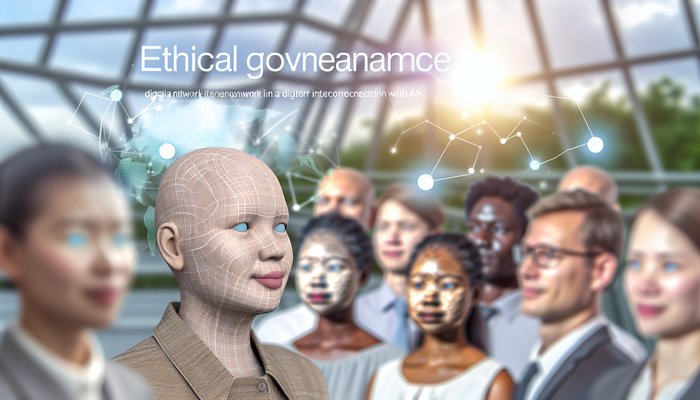
Introduction
In today’s rapidly evolving technological landscape, ethics and AI governance have become crucial elements of sustainable digital transformation. As AI reshapes industries and societies, innovative models that embed accountability and corporate responsibility are essential. Organizations are now recognizing that true progress goes hand in hand with ethical practices and democratic oversight.
This post brings together perspectives from influential sources including Isabelle Ferreras’s insights on corporate governance, the OECD AI guidelines, and the IEEE update on ethical AI standards. Our discussion underlines the need for reimagining the structure of AI companies and integrating diverse voices in decision-making, ultimately driving a balanced approach to innovation.
AI Governance Challenges
The exponential growth of artificial intelligence has introduced significant challenges in regulating and maintaining ethical practices. As highlighted by Ferreras, traditional regulatory frameworks and a sole focus on profit maximization have left a critical gap in corporate oversight. Accountability remains elusive, and external regulations often lag behind the rapid pace of AI development.
Key challenges include:
- The presence of vast information asymmetries between regulators and technology experts.
- The tendency of conventional corporate designs to prioritize capital investor interests over ethical considerations.
- The risks of regulatory capture in a fast-paced, innovation-driven environment.
Bicameral Governance Model for Ethical AI
A transformative solution proposed by experts is the integration of a dual majority, or bicameral, board within AI companies. This model advocates for a legally recognized body representing the interests and insights of AI workers, ensuring that those who develop these technologies have a decisive voice in key strategic decisions. By rebalancing decision-making power, companies can better align with societal interests and foster sustainable innovation.
Under this model, traditional shareholder boards are complemented by a parallel chamber that upholds corporate responsibility and acts as a counterbalance to profit-driven agendas. The inclusion of frontline experts not only drives quality deliberation but also ensures that ethical practices are embedded from the ground up.
Global Ethical Standards and Policy Frameworks
International efforts to guide AI development underscore the importance of robust ethical frameworks. The OECD AI guidelines set forth a visionary agenda for a human-centered AI ecosystem. Their value-based principles promote inclusive growth, sustainable development, and respect for human rights, while emphasizing the significance of transparency, explainability, and accountability in AI systems.
Key recommendations from the OECD guidelines include:
- Investing in interdisciplinary research and fostering public-private partnerships.
- Developing agile governance frameworks to adapt to technological advances.
- Enhancing human capacity through training and reskilling for the evolving digital landscape.
These principles help ensure that AI development is not only innovative but also ethical and inclusive.
IEEE’s Initiative for Ethical AI Standards
Complementing these international guidelines, the IEEE and the IEEE Standards Association have launched an initiative under the IEEE GET Program for AI Ethics and Governance Standards. This program makes a suite of global sociotechnical standards available to developers, organizations, and regulators, thereby promoting trustworthy and ethically designed AI systems.
The IEEE initiative focuses on:
- Raising global AI literacy by providing accessible guidelines.
- Aligning product development with ethical standards and risk management practices.
- Fostering international collaboration to ensure compliance with emerging regulatory frameworks such as the EU AI Act.
By making these standards freely available through the IEEE Xplore Digital Library, the initiative emphasizes that ethical innovation and digital transformation are mutually reinforcing processes.
Integrating Corporate Governance with Global Standards
Both the proposed bicameral governance model and the global standards provided by organizations like OECD and IEEE highlight the critical need to embed ethical decision-making within every layer of AI development. By empowering AI workers and ensuring that regulatory oversight is both informed and inclusive, companies can effectively mitigate risks and promote innovations that are in tune with democratic values.
This reformed model fosters an environment where continuous and meaningful dialogue shapes the evolution of AI, thereby addressing both internal accountability and external regulatory challenges. Institutions that embrace these practices are better positioned to navigate the complex interplay between technology, ethics, and corporate responsibility.
Conclusion and Next Steps
The future of ethical AI hinges on our ability to integrate robust corporate governance with internationally recognized standards. Redesigning corporate structures to include diverse voices not only mitigates risks but also champions accountability and transparency in AI development. This holistic approach is a cornerstone of sustainable digital transformation and ensures that AI technologies remain a force for the common good.
Our commitment to ethics and shared governance redefines the boundaries of innovation and empowers every stakeholder to participate in shaping the future of AI.
We invite industry leaders, policymakers, and AI enthusiasts to explore these ideas further and join the conversation on how to create a more equitable, transparent, and scientifically sound digital future. Engage with this vision by diving into the rich resources provided by organizations such as IEEE and OECD, and let’s work together to ensure that ethical AI becomes a reality for all.
Leave a Reply